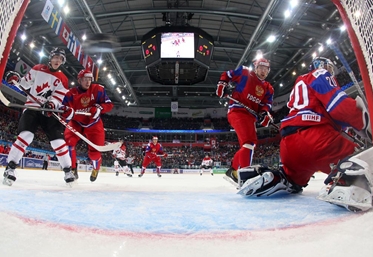Failure or not?
Failure or not?
Different opinions about Russian team

 Canada's Ryan Nugent-Hopkins #9 and Russia's Albert Yarullin #5 and Nikita Nesterov #9 look on as this puck finds the back of the net against Andrei Makarov #20. Photo: Andre Ringuette / HHOF-IIHF Images
Canada's Ryan Nugent-Hopkins #9 and Russia's Albert Yarullin #5 and Nikita Nesterov #9 look on as this puck finds the back of the net against Andrei Makarov #20. Photo: Andre Ringuette / HHOF-IIHF Images
Former world champion Alexander Semak, who is now head coach of the local MHL junior team Tolpar Ufa, believes that the Russian team was lacking a tactical game. The only bright spot was the goalies, Andrei Vasilevski and Andrei Makarov.
The famous captain of the Soviet “Red Machine", Boris Mikhailov, said: "The Russian team didn't have a trump card and our players lost one-on-one battles."
"Something was strange with our team in the first period, but after the intermission they had their chances when Sweden didn’t play that well,” Mikhailov said about the lost semi-final game. “Probably, [the Russians] wanted to win this game in style. But I can’t accuse the players of selfishness. Everybody ran back when the puck was lost. But they made mistakes on defence and there was no stable game on offence. Often forwards went alone and shot immediately. And the penalty shots in the shootouts were executed poorly.”
The talk in Russia is also about whether the right shooters were selected for the shootout. Forward Anton Slepyshev is a shootout specialist with Metallurg Novokuznetsk, but he was not allowed to shoot. Possibly Alexander Khokhlachyov, who is a technical forward on the first line, would also have been able to score.
This year’s Russian team had an acute shortage of snipers like Yevgeni Kuznetsov and Vladimir Tarasenko, who were the captains of the World Junior teams in 2012 and 2011 respectively. That's why coach Varnakov’s decision to take Nikita Kucherov to Ufa despite missing the preparation in summer was wise. He’s been the most efficient forward on the team. In the quarter-final against Switzerland he scored the team’s first goal and brought victory in the shootout.
Continue readingAnother question whether Russia had a leader. Was it Nail Yakupov? He didn't perform well and scored only in the game against Germany. That’s less than what fans expected from a number one overall |NHL draft pick. That's why Yakupov spoke only twice with journalists in the mixed zone. For him it was better to be silent and to play rather than talk.
Assistant captain Nikita Nesterov showed leadership. He encouraged his teammates in the locker room during the first intermission of the semi-final when Russia trailed Sweden 2-0. He is able to speak well, but he also made some mistakes on defence. Two times he lost the puck in the game against Switzerland and it led to opposition goals.
Nesterov’s partner Albert Yarullin brought the overtime victory in the opening game against Slovakia. He also scored the first goal in the game against the U.S. He constantly replaced Yakupov in the interview zone, where he provided good answers to difficult questions from journalists.
Varnakov's main problem in Ufa was the offence. The first line was a hollow shell of what it’s been in recent years. After Andrei Sigaryov’s injury in the game against the U.S., the coaches tried powerful forward Danil Zharkov in his place, but he was unsuccessful. In the semi-final game Kirill Kapustin was put on a line with Yakupov and Khokhlachyov.
Nevertheless, Varnakov used the first line as the power play until it became clear that the second line of Kucherov – Grigorenko – Slepyshev was more efficient. Grigorenko got the tying goal in the semi-final, and he was the best player in the difficult quarter-final against Switzerland.
Probably the serious injury he suffered in the autumn and the long recovery didn’t allow him to play his best hockey.
“This line could score more,” Varnakov commented.
According to the coach’s opinion, the third line of Shalunov – Tkachyov – Nichushkin was the most consistent line. But he couldn’t use the line at full strength due to the suspensions of Shalunov (for the game against the U.S.) and Nichushkin (for the quarter-final). Centre Yaroslav Kosov was moved from the fourth line to the third for that reason. Before that he scored a hat trick in the game against Germany. The fourth line helped the team well. But inviting Yevgeni Mozer to the team was controversial. Some thought strong forward Bogdan Yakimov could have been better.
In goal, there wasn’t much reason to complain for the Russians. Andrei Vasilevski and his namesake Makarov shared duties and deserve praise for their performances. They had great moments as they had last year when the duo led Russia to the gold medal game they lost 1-0 to Sweden.
.
Also this time Sweden prevailed in a knock-out game. The competitor was simply stronger. Roger Rönnberg said after the game: “The first period was probably the best during my years with this team.”
The Russian team now wants to end the tournament on a positive note in the bronze medal game against Canada. For Varnakov it could be the most important game in his coaching career, and may have an impact on his future.
Back to Overview





















































